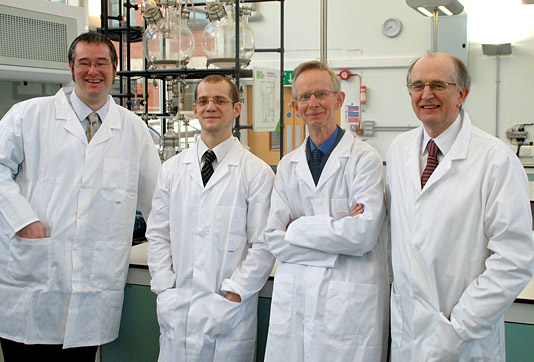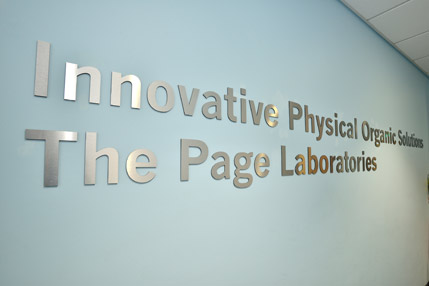Top science team reaches £2 million milestone
 IPOS founders (l-r) Dr Nicholas Powles, Dr Matt Stirling, Professor John Atherton and Professor Mike Page
IPOS founders (l-r) Dr Nicholas Powles, Dr Matt Stirling, Professor John Atherton and Professor Mike Page
Tue, 01 Jul 2014 13:20:00 BST
The University’s IPOS research unit, an Agilent Centre of Technological Excellence, now looks to expansion
A TEAM of chemists at the University of Huddersfield has brought in millions of pounds by carrying out advanced analytical work for clients who range from major healthcare companies to overseas government agencies. But it also finds time for innovative projects of its own – including environmentally-friendly fuels for cars, and food labels that flash a warning sign when meat is no longer safe to eat.
 The unit is named IPOS – Innovative Physical Organic Solutions – and its 18 scientists, ranging from chemists with widespread industrial experience to PhD researchers and apprentices working towards degrees – are based in state-of-the-art labs that have been declared a Centre of Technological Excellence by equipment manufacturer Agilent.
The unit is named IPOS – Innovative Physical Organic Solutions – and its 18 scientists, ranging from chemists with widespread industrial experience to PhD researchers and apprentices working towards degrees – are based in state-of-the-art labs that have been declared a Centre of Technological Excellence by equipment manufacturer Agilent.
IPOS was founded seven years ago and has just reached its latest milestone of £2 million from commercial income. When this is added to the grant funding the unit has received – including a substantial award from the European Regional Development Fund – the group has earned almost £5 million and it is completely self-supporting within the University.
As IPOS has evolved, the emphasis has tilted towards carrying out analytical work, said unit co-founder Dr Matt Stirling. “It is very diverse, but we get the more difficult tasks. If a company cannot solve a problem, they will bring it to us, because of the instrumentation and the expertise that we have,” he said.
IPOS also works on process development and has been involved in an intriguing range of projects, such as a request by the Danish Ministry of Food to find a more efficient method for analysing the levels of vitamins and nutrients in baby food. Its existing technique took an hour for each batch, but IPOS has succeeded in developing a streamlined process that has reduced this to seven minutes.
There have also been important collaborations with the healthcare sector, such as developing improved processes for manufacturing anti-bacterial wound dressings. Projects with the food industry include an analysis of the sugars in pro-biotic yoghurts, for a major dairy company.
 Future expansion
Future expansion
Demand for its services means that IPOS has plans to expand its facilities at the University of Huddersfield’s Page Laboratories – named after unit co-founder Professor Mike Page.
And in addition to undertaking work for outside contractors, IPOS is also collaborating with other University of Huddersfield experts on new projects. For example, in tandem with the engineer Professor Andrew Ball, the unit is investigating the use of ammonia as a fuel for specially-adapted engines.
“It would be an alternative to conventional organic fuels. When ammonia burns it forms water and nitrogen so there is no carbon dioxide. People have run vehicles on ammonia, but it has not yet proved too popular, so we have decided to get over some of the challenges,” said Dr Nicholas Powles, also an IPOS co-founder.
He went on to describe some of the other innovative work that the unit has on the agenda, including smart labels for meat products. When bacteria have developed in the meat, they would trigger a sensor embedded in the label, so that it turns a warning shade of red. The result would be increased food safety and less food waste.







